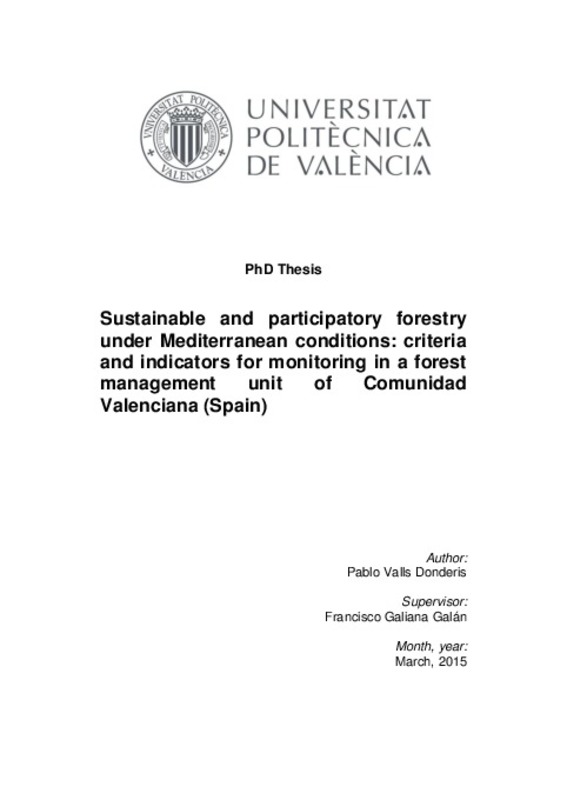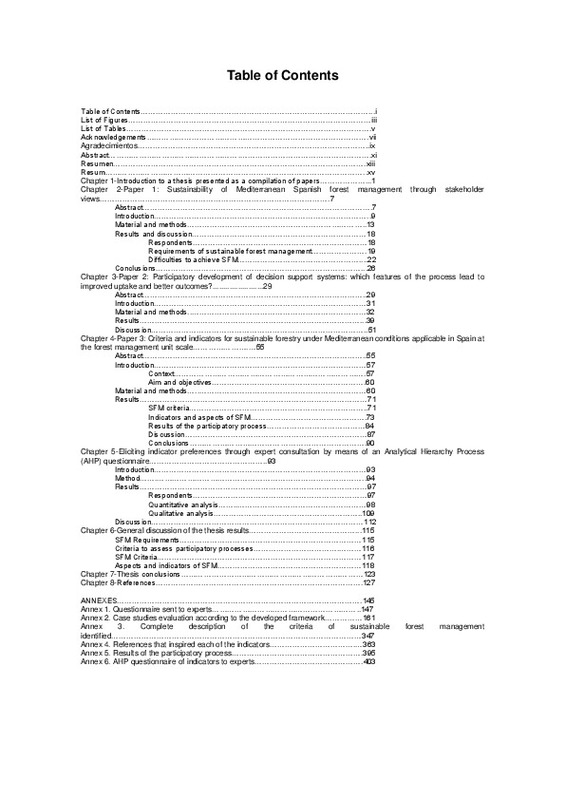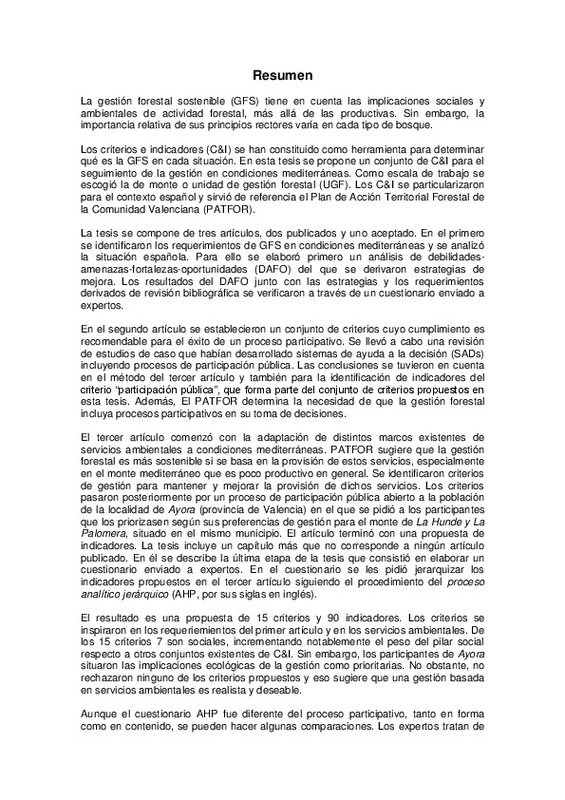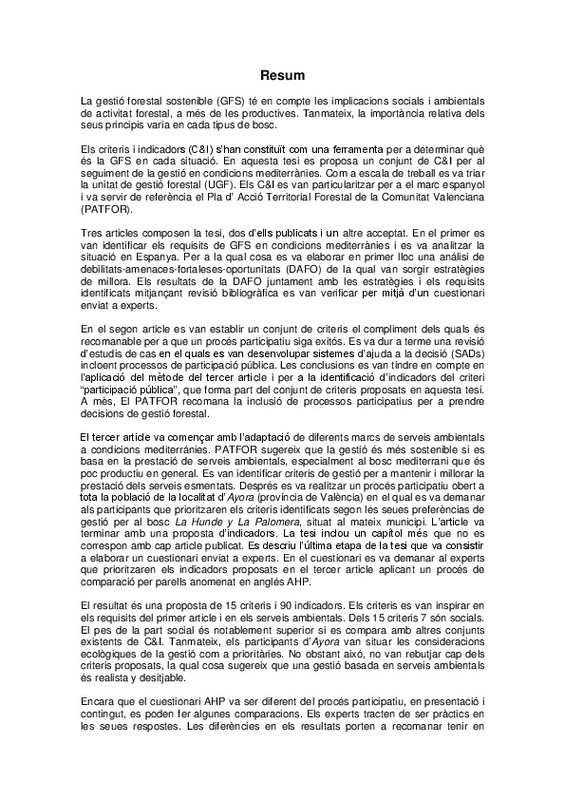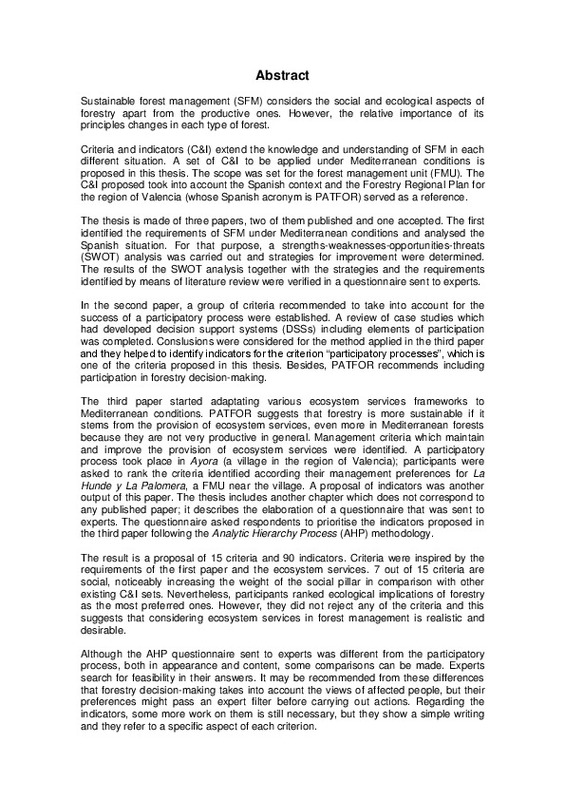|
Resumen:
|
Sustainable forest management (SFM) considers the social and ecological aspects of
forestry apart from the productive ones. However, the relative importance of its
principles changes in each type of forest.
Criteria and ...[+]
Sustainable forest management (SFM) considers the social and ecological aspects of
forestry apart from the productive ones. However, the relative importance of its
principles changes in each type of forest.
Criteria and indicators (C&I) extend the knowledge and understanding of SFM in each
different situation. A set of C&I to be applied under Mediterranean conditions is
proposed in this thesis. The scope was set for the forest management unit (FMU). The
C&I proposed took into account the Spanish context and the Forestry Regional Plan for
the region of Valencia (whose Spanish acronym is PATFOR) served as a reference.
The thesis is made of three papers, two of them published and one accepted. The first
identified the requirements of SFM under Mediterranean conditions and analysed the
Spanish situation. For that purpose, a strengths-weaknesses-opportunities-threats
(SWOT) analysis was carried out and strategies for improvement were determined.
The results of the SWOT analysis together with the strategies and the requirements
identified by means of literature review were verified in a questionnaire sent to experts.
In the second paper, a group of criteria recommended to take into account for the
success of a participatory process were established. A review of case studies which
had developed decision support systems (DSSs) including elements of participation
was completed. Conslusions were considered for the method applied in the third paper
and they helped to identify indicators for the criterion “participatory processes”, which is
one of the criteria proposed in this thesis. Besides, PATFOR recommends including
participation in forestry decision-making.
The third paper started adaptating various ecosystem services frameworks to
Mediterranean conditions. PATFOR suggests that forestry is more sustainable if it
stems from the provision of ecosystem services, even more in Mediterranean forests
because they are not very productive in general. Management criteria which maintain
and improve the provision of ecosystem services were identified. A participatory
process took place in Ayora (a village in the region of Valencia); participants were
asked to rank the criteria identified according their management preferences for La
Hunde y La Palomera, a FMU near the village. A proposal of indicators was another
output of this paper. The thesis includes another chapter which does not correspond to
any published paper; it describes the elaboration of a questionnaire that was sent to
experts. The questionnaire asked respondents to prioritise the indicators proposed in
the third paper following the Analytic Hierarchy Process (AHP) methodology.
The result is a proposal of 15 criteria and 90 indicators. Criteria were inspired by the
requirements of the first paper and the ecosystem services. 7 out of 15 criteria are
social, noticeably increasing the weight of the social pillar in comparison with other
existing C&I sets. Nevertheless, participants ranked ecological implications of forestry
as the most preferred ones. However, they did not reject any of the criteria and this
suggests that considering ecosystem services in forest management is realistic and
desirable.
Although the AHP questionnaire sent to experts was different from the participatory
process, both in appearance and content, some comparisons can be made. Experts
search for feasibility in their answers. It may be recommended from these differences
that forestry decision-making takes into account the views of affected people, but their
preferences might pass an expert filter before carrying out actions. Regarding the
indicators, some more work on them is still necessary, but they show a simple writing
and they refer to a specific aspect of each criterion.
[-]
|






